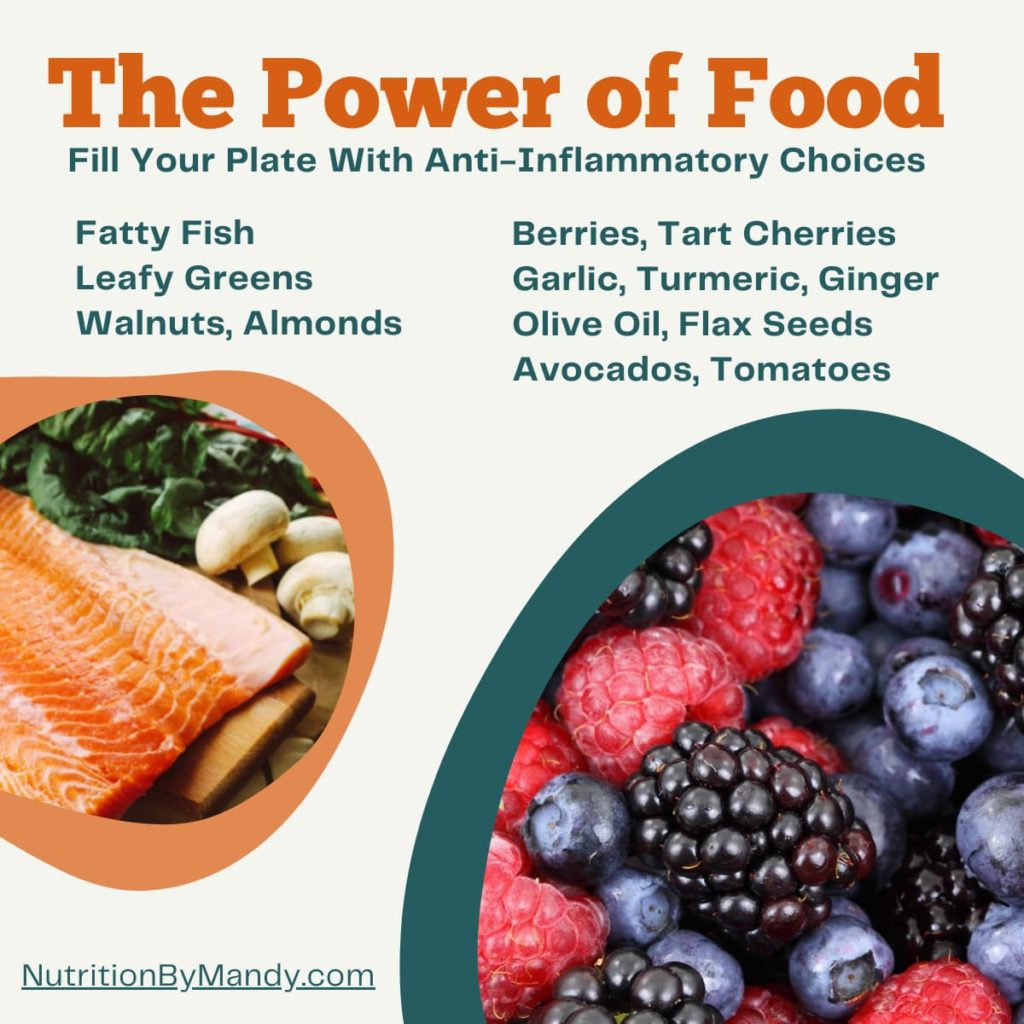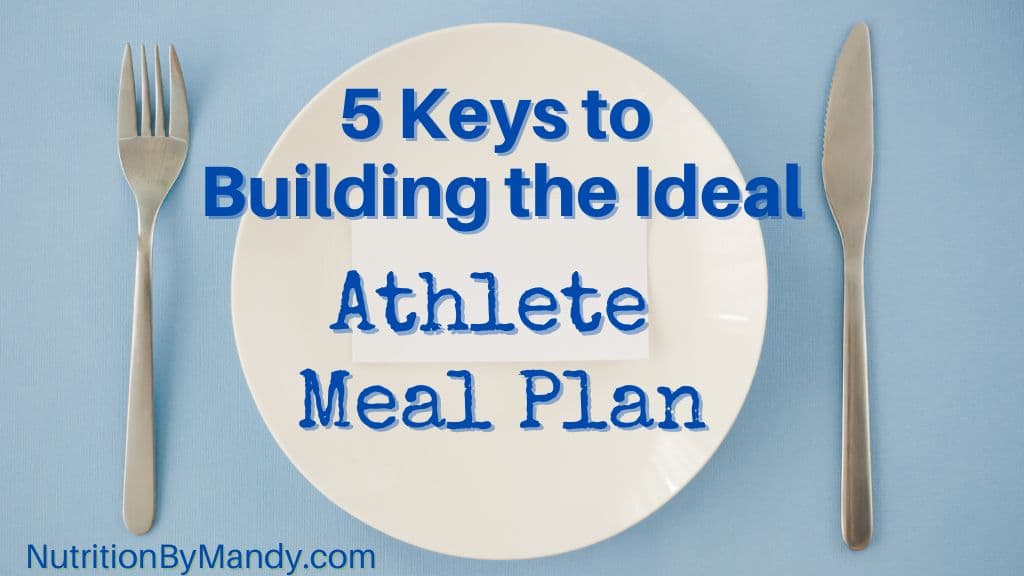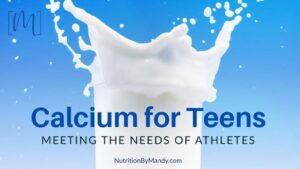Last Updated on December 6, 2024 by Mandy Tyler, M.Ed., RD, CSSD, LD
5 Keys to Building the Ideal Athlete Meal Plan
It is important for athletes to have a sports nutrition meal plan in place to support both health and performance goals. Knowing what foods to eat and when, can help ensure athletes are fueled to train and perform at their best.
Below are 5 key ideas for building an ideal athlete meal plan to support performance.
Key #1: Carbohydrates – The Foundation of an Athlete’s Meal Plan
Carbohydrate-rich choices should be the foundation of your athlete meal plan. Carbohydrates provide athletes with the energy needed to train and perform at their best.
Athletes can get carbohydrates in your diet from a variety of food groups, including:
- Grains
- Fruit
- Starchy vegetables
- Dairy
Carbohydrate Needs of Athletes
Similar to gas in a tank to fuel a car, carbohydrates provide the body with the energy needed to perform at its best.
The carbohydrate needs of athletes vary based upon the intensity and duration of activity the athlete is engaged in. Athletes participating in low-intensity or skill-based activities need less carbohydrates than athletes engaged in high-intensity, long duration exercise sessions (1).
Likewise, when creating your athlete meal plan, you will need more carbohydrates on days you will be exercising more intensely or for a longer duration than on low-intensity workout days or off-days.
Fluctuating the amount of carbohydrates consumed based on activity can help athletes tailor their daily meal plan to meet their performance needs.

Fuel Your Performance with Carbohydrates
Prior to a workout or competition, athletes should focus on consuming easy to digest, carbohydrate-rich snacks. High-carb snacks will provide athletes with a quick source of energy as they head into the activity.
Ideas for carbohydrate-rich, pre-game snacks include:
- Banana, small piece of fresh fruit, dried fruit
- Applesauce squeeze pouch
- Pretzels, pita chips, snack crackers
- Low-fat granola bar, cereal bar, fig bar
- Sports drinks, chews, gels
After exercise, athletes should add carbohydrates to their post-workout meals and snacks. Continuing with the analogy of a car’s gas tank, it is important for athletes to refuel following activity.
Key #2: Include Lean Protein in Your Athlete Meal Plan
Including lean protein is the second key to building an ideal athlete meal plan.
To get the most benefit from protein intake, athletes are encouraged to consume protein throughout the day with meals and snacks (2). Therefore, when you build your athlete meal plan you want to ensure each meal and snack includes a source of lean protein.
Protein recommendations for athletes are based upon body weight. Athletes are encouraged to consume ~0.25-0.3 grams of protein per kg of body weight with meals and snacks spaced evenly throughout the day (1, 2). For most athletes this calculates to be approximately 25-30 grams of protein at each eating occasion.
Sources of protein to include on your athlete meal plan include:
- Chicken, turkey, seafood, lean cuts of red meat and pork
- Eggs
- Milk, cheese, yogurt, and other dairy products
- Beans, legumes, nuts, seeds
- Soy and tofu
Athletes following a vegetarian or vegan diet can meet their protein needs through plant-based food sources (3), such as beans, legumes, soy, and tofu.
However, careful planning of plant-based meals is important to ensure athletes consume adequate protein and essential nutrients in their overall sports nutrition meal plan.

Recovery Nutrition: Build and Repair with Protein
Following exercise, athletes should plan to include protein in their post-game meals and snacks to support their recovery nutrition needs.
When athletes exercise, they breakdown their muscles. Thus, consuming protein following activity can help support the repair and building-up of lean muscle mass.
Athletes can easily meet their recovery nutrition protein needs with real food. Consider the ideas below for adding protein to post-workout meals and snacks.
- Greek yogurt
- Low-fat chocolate milk
- High-protein milk
- Cottage cheese, string cheese
- Beef or turkey jerky
- Hard-boiled eggs
- Shredded rotisserie chicken
- Lean deli meat: Turkey, ham, chicken, roast beef
- Individual packets of tuna or salmon
- Nuts, nut butters, seeds, seed butters
- Post-workout smoothie
Add Snacks Containing Protein to Your Athlete Meal Plan
Enjoying well-planned snacks that contain protein can support athletes with meeting their daily nutrition needs.
Athletes can create balanced snacks by combining a carbohydrate-rich food item with a source of lean protein.
Easy healthy snack ideas for athletes include:
- Greek yogurt with berries and granola
- Peanut butter and jelly on honey wheat bread
- String cheese with whole grain crackers
- Cottage cheese with pineapple
- Apple slices with almonds
- Beef jerky with fig bars
- Granola bars with nut butter
- Hummus with pita chips
- Trail mix made with pretzels, whole grain cereal, dried fruits, and nuts
Key #3: Balance Out Your Athlete Meal Plan with Healthy Fats
When putting together your athlete meal plan, balance out your carbohydrate and protein intake with healthy sources of unsaturated fats.
Dietary fat plays many important roles in the body. Fat is necessary for the absorption, transportation, and storage of fat-soluble vitamins (Vitamins A, D, E, K). Fat helps provide protection for our internal organs. Essential fatty acids are also necessary for optimal brain function.
Here are ideas for foods containing healthy, unsaturated fats to add to your athlete meal plan.
Fatty Fish
Cold-water fatty fish, such as salmon, tuna, mackerel, herring, and sardines, is an excellent source of omega-3 fatty acids.
Omega-3 fatty acids are considered essential fatty acids because the body cannot produce them. They have many important roles in the body, such as supporting optimal brain health, cardiovascular function, and working to help reduce inflammation (4).
Aim to include several servings of fatty fish in your athlete meal plan throughout the week.

Avocados: Healthy Addition to an Athlete’s Meal Plan
Avocados are a nutrient-dense way to add healthy fats, fiber, vitamins, and minerals to an athlete’s diet (5).
The majority of fat found in avocados is monounsaturated fat, a type of healthy, unsaturated fat. When eaten in moderation, monounsaturated fats are a healthy addition to an athlete’s meals and snacks (6).
Avocados also contain many vitamins and minerals, including the electrolyte potassium. Potassium helps the body maintain fluid balance, transmits nerve signals, and plays an important role in muscle contraction (7).
Athletes can add sliced avocados to their morning toast, enjoy it in burrito bowl, or blend it into a high-calorie smoothie to boost the nutrient content of the drink.
Nuts and Nut Butters
Nuts and nut butters contain monounsaturated fats, protein, vitamins, and minerals, making them a nutritious addition to your meals and snacks. In addition, nuts provide a good source of phenolic compounds, which serve as antioxidants in the body (8).
Different types of nuts provide different nutritional benefits, so try to include a variety in your overall sports nutrition meal plan.
Seeds
Seeds are an excellent way to add fiber, unsaturated fat, protein, antioxidants, vitamins, and minerals to your athlete meal plan (9).
Aim to include a variety of seeds, such as flaxseeds, chia seeds, pumpkin seeds, and sunflower seeds, in your sports nutrition meal plan. Consider topping your salads with seeds and adding them into your protein overnight oats, smoothies, and yogurt.
Extra Virgin Olive Oil
Similar to avocados and nuts, olive oil is in monounsaturated fats. Olive oil also contains polyphenols, which have antioxidant and anti-inflammatory effects in the body (10).
Olive oil can be used as a dressing on your salad, as a topping on avocado toast, used to sauté your vegetables, or to cook your morning eggs.

Key #4: Hydration: Critical Component of Your Athlete Meal Plan
Athletes should aim to make hydration a daily priority as it is important for both health and performance.
Dehydration increases the risk of heat illness, especially when exercising in a hot and humid environment. In addition, even mild dehydration can negatively impact aerobic sports performance and cognitive function (11).
Given this, athletes do not want to start a practice or competition in a dehydrated state. Consuming fluid with each meal is a good way to stay on top of your hydration goals.
In addition to water, consider enjoying low-fat milk or 100% fruit and vegetable juices with your meals. Drinking nutritious beverages is a simple way to add vitamins and minerals to your daily intake. To avoid filling up on the beverage, eat your meal first and then consume your beverage.
Enjoying fruits and vegetables that contain a high-water content can also support athletes with their hydration goals. Foods such as watermelon, cantaloupe, strawberries, oranges, celery, and cucumbers all have a high-water content and are great additions to an athlete’s meal plan.
Hydrate Surrounding Activity
Hydration is important for athletes before, during, and after activity. When athletes sweat, they lose both fluids and electrolytes in their sweat. Athletes vary greatly in regard to the amounts of fluids and electrolytes lost in sweat during an exercise session.
Thus, athletes should consider working with a sports dietitian nutritionist for assistance with developing an individualized hydration plan for activity.
The sports dietitian nutritionist can help calculate your sweat rate, provide tips for hydrating during activity, and ensure you have a plan in place that meets your specific needs.
Key #5: Add Anti-Inflammatory Foods to Your Athlete Meal Plan
A well-planned sports nutrition meal plan will include foods that can help reduce inflammation in the body and enhance recovery.
If you are looking to take full advantage of the power of food, try adding these anti-inflammatory foods to your athlete meal plan.
- Berries and cherries
- Dark green leafy vegetables
- Tomatoes, broccoli, bell peppers, mushrooms, avocados
- Fatty fish: Salmon, tuna, mackerel, herring, and sardines
- Nuts: Walnuts, almonds, pistachios
- Seeds: Chia seeds, flaxseeds
- Herbs and spices: Turmeric, ginger, garlic, cinnamon, rosemary

Ready to Build Your Athlete Meal Plan
You are now set with the 5 key steps to building the ideal athlete meal plan to support performance.
If you are looking for additional meal planning tips, check out my blog: Meal Prep for Athletes – 5 Easy Steps to Success.
Join the Nutrition By Mandy Email List & Get a Free Athlete’s Grocery List
Click HERE to join the Nutrition By Mandy e-mail list. When you join you will receive a free athlete’s grocery list to print and take with you to the store.
About the Author
Mandy Tyler is a Sports Dietitian Nutritionist in the San Antonio, TX area. She is a Registered and Licensed Dietitian, a Board-Certified Specialist in Sports Dietetics, a Licensed Athletic Trainer, and is a Certified Exercise Physiologist through the American College of Sports Medicine. Mandy has experience working with athletes at the high school, collegiate, and professional levels. She believes the key to reaching one’s full potential, both in everyday life and in sports performance, relies on a healthy nutritional foundation.

If you are looking to take your performance to the next level, make sure to check out my new Sports Nutrition Game Day Guide. This downloadable guide is written to help athletes develop an individualized plan to achieve peak performance on game day.





